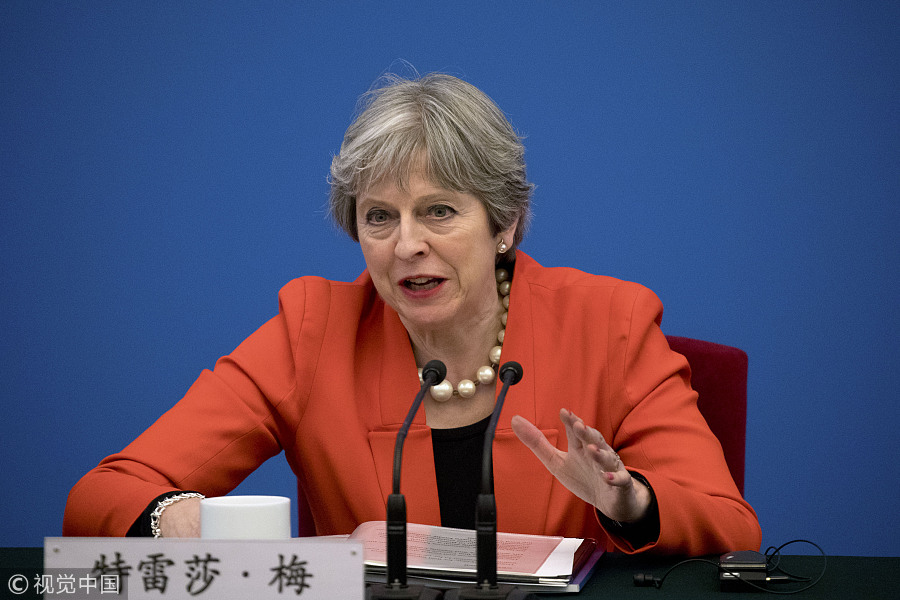UK CEOs explore golden opportunities as PM visits China


BEIJING - "Although I am maybe visiting in winter, I have had the warmest of welcomes," said visiting British Prime Minister Theresa May Wednesday afternoon in Beijing, after talks with Chinese Premier Li Keqiang.
May is on her first official visit to China, which started Wednesday morning. She said that she thought the tour had fallen at an "auspicious" time for the two sides.
Taking a glimpse of May's visit, it is hard to ignore the 50-strong British entrepreneur delegation accompanying her. The delegation, grouping CEOs covering areas such as finance, education, trade, auto-making and insurance, reflected the British side's will to seek closer trade and economic ties with China.
"We discussed how our economies have complementary strength. Trade between our two countries is already at record levels, worth 59 billion British pounds ($83.5 billion). UK exports to China have grown by 60 percent since 2010. And UK has been one of the largest European recipients of China's foreign direct investments," said May when meeting the media together with Premier Li.
"We are determined to deepen our trade relationship even further," she said.
May witnessed new progress in the development of UK-China ties. A series of events came on the heels of her arrival in Beijing Wednesday.
Apart from her talks with Li, the two leaders also witnessed the signing of twelve cooperative documents, covering such fields as entrepreneurs, customs, education, innovation and finance.
A China-UK CEO Council was also freshly inaugurated Wednesday afternoon. Consisting of over 30 renowned companies, universities or organizations from the two sides, it will exert new vigor for the business people to enhance ties.
"With world-renowned open market and financial resources, the UK is an important and appealing investment destination of Chinese companies," said Tu Guangshao, chairman of the Board of China Investment Corporation, at the inaugural meeting of the council.
"The increasingly deepening development of the golden era of China-UK relations has prompted the two economies to complement each other's advantages," Tu said, adding that enterprises from both countries were beneficiaries.
According to Tu, the company has invested in various fields in the UK, including infrastructure, the open market and commercial logistics, with aggregate investment exceeding $15 billion.
"My presence at this event demonstrates the great importance the two countries have attached to nuclear cooperation," said He Yu, chairman of the Board of China General Nuclear Power Group (CGN).
Nuclear technology sharing and cooperation has gone well, thanks to the two governments' great attention and support, he stressed.
The landmark Hinkley Point C nuclear project, with one-third of investment from CGN, has been described by local media as "Britain's first new nuclear power station in a generation."
Britain is China's second largest trading partner within the European Union (EU) and China is Britain's second largest non-EU trading partner.Trade volume between the two countries hit $79 billion in 2017, up nearly 6.2 percent from the previous year, with Britain's exports to China increasing by 19.4 percent.
More than 500 Chinese enterprises have set up their offices in Britain, with a total of $21.8 billion invested in projects ranging from traditional areas like trade, finance and telecommunications to such emerging areas as new energy, high-end manufacturing, infrastructure and research centers.
"In previous exchanges between China and the UK or the EU, governmental dialogue mechanisms take a large proportion, and there is a lack of dialogue mechanism among enterprises or trade associations," said Cui Hongjian, a scholar with the China Institute of International Studies.
"Through the expansion of entrepreneurs' communication, the two countries can let the market and enterprises play a more active role under the guidance of the government, so as to promote win-win cooperation and promote bilateral relations," said Cui.
Beijing is May's second stop in China. She toured the Chinese city of Wuhan earlier Wednesday, and announced details of a new approach covering pre-school through to postgraduate education.
According to the official website of the UK Embassy in China, the approach includes a new commitment to extend the UK-China Maths Teacher Exchange primary school program for a further two years to 2020. This will enable an additional 140 primary teachers in England to benefit from further training in China.
A press release on the website said that "education deals totalling more than 550 million British pounds ($778.4 million) will be announced as part of the visit, creating over 800 jobs in the UK."
Chinese students already constitute the largest single source of overseas students in the UK, with 155,000 students.
May will wrap up the visit Friday. She will also tour China's economic hub Shanghai.
The three-day visit is also the first by a British prime minister to China, since the two countries agreed to embrace a golden era in bilateral relations in October 2015.




































